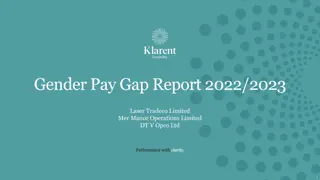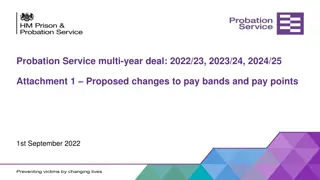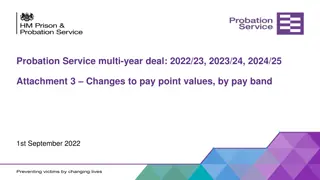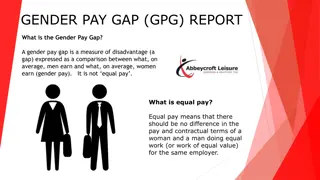Challenges in Teacher Pay Negotiations Amid Cost of Living Crisis
The current offer for teacher pay is seen as a real-terms cut, undervaluing their efforts during the pandemic. Teachers are seeking fair and reasonable pay increases as the cost of living crisis intensifies. Negotiations are crucial for maintaining teacher morale and ensuring quality education. The Scottish Negotiating Committee for Teachers plays a key role in determining national terms and conditions, including pay and leave allowances. Teachers' representatives are elected to advocate for teachers' interests in these negotiations.
Download Presentation

Please find below an Image/Link to download the presentation.
The content on the website is provided AS IS for your information and personal use only. It may not be sold, licensed, or shared on other websites without obtaining consent from the author.If you encounter any issues during the download, it is possible that the publisher has removed the file from their server.
You are allowed to download the files provided on this website for personal or commercial use, subject to the condition that they are used lawfully. All files are the property of their respective owners.
The content on the website is provided AS IS for your information and personal use only. It may not be sold, licensed, or shared on other websites without obtaining consent from the author.
E N D
Presentation Transcript
Real terms-pay cut - Given the current levels of inflation, the offer represents a real-terms pay cut. Efforts of teachers undervalued: The total value of the offer, now 10 months overdue, fails to recognise or reward the mammoth efforts teachers have made to maintain education throughout the challenge of the pandemic Just not good enough: A sub-inflationary pay increase is unacceptable. Education Recovery relies on teachers and teachers should be able to rely on fair and reasonable pay increases. Cost of living: As we move into 2022 the cost-of- living crisis is hitting hard with inflation and interest rates both on the rise. April s National Insurance increase will further erode teachers pay. Time for serious negotiation!
GTCS Elections
Permanent, Supply Permanent, Supply and Temporary and Temporary Teaching Jobs: Teaching Jobs: Knowing Your Terms and Conditions Eilidh Gittus (Edinburgh Organiser) Alison Murphy (Edinburgh LA Secretary)
A Look at the Definitions National and Local Negotiations SNCT Code of Practice Permanent Contracts-Duties and Pay Short Term Supply- Duties and Pay Fixed Term/Temporary Contracts- Duties and Pay What to Expect from the Employer EIS Structures and How to Get Involved Over to you What What We Will We Will Cover Cover
Definitions Definitions Permanent Supply or Fixed Permanent Supply or Fixed Term/Temporary Contract? Term/Temporary Contract? Permanent: No fixed end-date. Full or part-time contract. Full Time (FTE)=35 hours. Part Time (PT)=pro rata of 35 hour week. Short-Term Supply: Short term engagements of up to two days. Fixed Term / Temporary: Engagement of three days and over.
Nationally Nationally Negotiated Negotiated Terms and Terms and Conditions Conditions The Conditions of Service for all teachers working in local authorities in Scotland are determined through the Scottish Negotiating Committee for Teachers (SNCT). The SNCT sets a number of your contractual terms and conditions at national level, including: o Pay o Sickness Allowances o Class Size Maxima o Maternity/ Parental Leave and Pay The EIS has the largest number of representatives on the teachers panel of the SNCT. EIS representatives are elected teachers, ensuring a strong link between those negotiating your terms and conditions and the realities in the classroom. Your full terms and conditions are contained in the SNCT handbook and can be accessed via www.snct.org.uk.
Locally Locally Negotiated Negotiated Terms and Terms and Conditions Conditions SNCT devolves a number of matters to Local Negotiating Committees for Teachers (LNCTs) EIS representatives negotiating at LNCT level are practicing teachers Many of these devolved matters have particular relevance for those engaged in supply work or fixed term contracts They include: o cover agreements, o appointment procedures, o specific duties and job remits, o transfer of temporary teachers to permanent staff, o leave and absence arrangements and o disciplinary and grievance procedures. They can be found in the LNCT section of the SNCT website: https://www.snct.org.uk/lnctAgreements.php
Working Year and Working Week Working Year and Working Week Teachers (other than short term supply teachers) shall have a 35 hour working week. The working week shall apply on a pro rata basis to teachers on part-time contracts. Within the 35-hour week, a maximum of 22.5 hours will be devoted to class contact. An allowance of no less than one third of your actual class contact commitment is for preparation and marking (7.5 hours). The use of remaining time (5 hours per week) will be subject to negotiation in your annual Working Time Agreement. All tasks which do not require the teacher to be on the school premises can be carried out at a time and place of your choosing If you are required to travel between schools during the school day, that time is regarded as pupil contact time.
Permanent and Fixed Term Contracts: Duties Permanent and Fixed Term Contracts: Duties Expected to carry out the main duties of all class teacher Subject to the policies/practice of the school/local authority These duties include: - manage and organise classes through planning and preparing for teaching and learning assess, record and report on the work of pupils progress to inform a range of teaching and learning approaches prepare pupils for examinations and where required, assist with their administration contribute towards good order and the wider needs of the school develop the school curriculum contribute to the school and council planning and improvement processes. maintain and develop knowledge and skills and contribute to the professional development of colleagues including probationary and student teachers.
Fixed Term Temporary Contracts
Permanent and Fixed Term Permanent and Fixed Term Contracts: Pay Contracts: Pay Those engaged on fixed term contracts are paid in the same manner as those on permanent contracts. Pay Point Annual Salary 0 27,498 1 32,994 The details on how teachers pay is calculated are contained in the Part 2, Appendix 2.19 (National Pay and Leave Specification of the SNCT Handbook). A link to this can be found below. 2 34,863 3 36,891 4 39,231 5 41,412 SNCT Handbook, Part 2, Appendix 2.19
SNCT Codes of Practice for Supply SNCT Codes of Practice for Supply Teachers Teachers Local authorities as employers are required to draw attention to the two main SNCT Codes of Practice of relevance to those engaged in supply work. Appendix 2.8 - Code of Practice on the use of Temporary Contracts. Appendix 2.8A - Code of Practice on Short- Term Supply. www.snct.org.uk
Some of the main duties of teachers on short-term supply differ from those engaged on fixed/long-term contracts. Short Term Short Term Supply: Supply: Duties Duties The main duties of teachers engaged in short-term supply are to: Teach assigned classes Correct work, as part of ongoing classwork Maintain a record of work Contribute towards good order in the school
Pay for short-term supply is calculated on the hourly rate 235 Days x 7 Hours of the annual rate of salary for teachers. Rate will depend on the incremental point on the Main Grade Scale that the teacher qualifies for All those engaged in short-term supply receive a 10% uplift in their pay for preparation and correction time. Supply teachers may only be engaged in a full or half day block. No cap on the maximum class contact time for short-term supply teachers. Short Term Short Term Supply: Pay Supply: Pay Those having difficulty calculating rate of pay should contact payroll department
Managed by CEC Very important to check they have all correct details Currently, emails with offers first come, first served If doing a short term supply engagement: Paid via timesheet fill in hours you are with a class You have a right to be employed for the full day (or half day) If turn up, must be paid Vital to get timesheet signed, and always take a copy Paid in arrears effectively, two months The reality of supply work in Edinburgh
If known at the outset that vacancy will last more than 3 months, it should be advertised. If appointed to this sort of contract, will go onto payroll no timesheets etc. Do check specifics around holiday pay (it s complicated!) Beware of overpayments they MUST be refunded, even if not your fault Fixed term contracts
Long term supply according to the SNCT, there is no such thing. As soon as you are doing more than 2 days in one school (including the same day each week) you are on a fixed term contract However, reality is more messy If you are in a school for MORE than 2 days, then this is what should happen: 22.5 hours contact time, but working full 35 week (or it can be part time check!) Still do timesheets but different multiplier (keep copies!!!) Not usually issued with written contract, but can request it Long term supply
What to Expect From Your Employer: What to Expect From Your Employer: Short-Term Supply Local authority employers must: ensure short-term supply is managed correctly and efficiently. must carry out the actions as set out in Code of Practice on Short-Term Supply (SNCT Appendix 2.8A Fixed Term Contracts Local authority employers should: - ensure a fixed term or temporary contract is issued in accordance with nationally agreed SNCT conditions of service and the relevant local devolved procedures. * Edinburgh have a Local Agreement about permanency after 2 years. * Employers need to make any contract permanent after four years consecutive service.
What to Expect From Each School: What to Expect From Each School: Headteacher responsibility to ensure engaged in accordance with Code of Practice. You should be afforded all the relevant information you require including: School day timings. Class timetable Planned work / lesson plans. Medical Action Plans and Additional Support for Learning information Relevant Child Protection documentation. Class registration details / details of registration process. Access to Resources such as stationery and IT equipment.
What is Expected What is Expected of You? of You? City of Edinburgh Council has produced a handbook for supply teachers working in Edinburgh schools. Information will come to you from CEC so please check your emails!
What were doing in Edinburgh to support supply teachers: We keep offering joint training for HTs and BMs Talks with CEC around booking systems etc Challenging where pay etc incorrect These sessions! Knowledge is power . Supporting individual members with issues around maternity, sick pay, entitlement to permanency Ongoing discussions around recruitment processes Pushing for more permanent contracts Supporting informal networks Looking to raise profile of, and support for, supply teachers in schools Several motions have gone to EIS HQ for national action
What To Do What To Do If Things If Things Aren t Right: Aren t Right: Check - is practice in line with SNCT Appendix 2.8 (fixed term / temporary contracts) or Appendix 2.8A (short- term supply) If there are issues make contact with your EIS School Representative. For advice contact your EIS Local Association Secretary, Alison Murphy edinburghla@eis.org.uk
Find out who the EIS Reps are in your school Identify your EIS Local Association Secretary Visit the LNCT sections of the SNCT website- know where to go for local agreements www.snct.org.uk Attend EIS Branch meetings Find out about events/ training on offer through your EIS Local Association If your school does not have a rep contact your Local Association Secretary and Organiser egittus@eis.org.uk EIS Support EIS Support and Getting and Getting Involved Involved
Over Over to you to you























